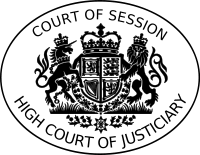Lord President of the Court of Session
| Lord President of the Court of Session Lord Justice General | |
|---|---|
 | |
| Style | The Right Honourable |
| Appointer | Monarch on the advice of the First Minister |
| Term length | Life tenure |
The Lord President of the Court of Session is the most senior judge in Scotland, the head of the judiciary, and the presiding judge of the College of Justice and the Court of Session.[1] The Lord President is also the Lord Justice General of Scotland and the head of the High Court of Justiciary, the two offices having been combined in 1836.[2] The Lord President has authority over any court established under Scots law, except for the Supreme Court of the United Kingdom.[3]
The office of Lord Justice General is derived from the justiciars who were appointed from at least the twelfth century. From around 1567 onwards it was held heritably by the Earl of Argyll until the heritability was resigned to the Crown in 1607.
The current Lord President of the Court of Session is Lord Carloway, who was appointed to the position on 18 December 2015.[4]
In Scotland the Official Oath is taken before the Lord President of the Court of Session.[5]
Officeholders
| Part of a series on |
| Scots law |
|---|
.svg.png) |
|
Legal profession
|
Justiciars
(called Lord Chief Justices by Scot of Scotstarvet).
- Argadus, Captain of Argyll, in the reign of Ethodius
- Comes Dunetus; in the reign of King William the Lion. (Donnchad II, Earl of Fife)
- William Comyn
- Richard Comyn
- David, Earl of Huntingdon (died 1219)
- Walter Clifford, Justiciary of the Lothians
- 1216: Allan, Justiciary to King Alexander II
- 1224: William Cumin, Earl of Buchan (reign of Alexander III)
- Walter (died 1241), son of Allan High Steward of Scotland
- 1239: William, Earl of Ross, "Lord Chief Justice of Scotland"
- 1243: David de Lindsay, Justiciary of the Lothians
- Alexander (d.1283), High Steward of Scotland to King Alexander II
- Hugo de Barclay, Justiciary of the Lothians
- 1253: Alexander Cumin, Earl of Buchan
- bef 1319: Sir Robert de Lawedre of The Bass (died Sept 1337), Justiciary of the Lothians
- 1328: Sir Robert Lauder of Quarrelwood (died between 1367–70), Justiciary North of the Forth
- 1366: Robert de Erskine, Justiciary South of the Forth for King David II
- bef 1372: Alan de Lawedre of The Bass, Whitslaid, & Haltoun, Justiciary South of the Forth, (he received a pension for holding this post in 1374).
- 1372: Sir William Douglas, 1st Earl of Douglas (died May 1384), Justiciary South of the Forth.
- 1425: Sir Robert de Lawedre of Edrington & The Bass (d.1451), "Justiciario Scotia"
- 1437: James Douglas, Earl of Avondale and Lord Balveny[6]
- 1446: Patrick de Ogilvy, Justiciary South of the Forth
- 1457: John, Lord Lindsay of the Byres, Justiciary South of the Forth
- William Sinclair, 3rd Earl of Orkney & Caithness (d.1480), Justiciary North of the Forth for King James II
- 1477: John Haldane of Gleneagles, Justiciary North of the Forth
- Patrick Hepburn, 1st Lord Hailes (died after 1482), and Robert, 2nd Lord Lyle, Justiciaries South of the Forth
- Andrew, Earl of Crawfurd, and George Gordon, 2nd Earl of Huntly, Justiciaries North of the Forth
- 1488: Robert, 2nd Lord Lyle d.c1497), "Lord Chief Justice"
- 1489: John Lyon, 3rd Lord Glamis (died 1 April 1497), and John Drummond, 1st Lord Drummond: "Justice-General"
- 1492: Robert, 2nd Lord Lyle, and John Lyon, 3rd Lord Glamis
- 1494: John Drummond, 1st Lord Drummond (died c1519)
- 1504: Andrew Gray, 2nd Lord Gray, and John Kennedy, 2nd Lord Kennedy
- 1514: Colin Campbell, 3rd Earl of Argyll
- 1526: Archibald Douglas of Kilspindie
- 1532: Alexander Mylne, Abbot of Cambuskenneth
- 1537: Archibald Campbell, 4th Earl of Argyll
- 1567: Sir Colin Campbell, 6th Earl of Argyll, (d.1584) (heritably)
- 1578: Sir Colin Campbell, 6th Earl of Argyll, (re-appointment?)
- 1589: Archibald Campbell, 7th Earl of Argyll, (who exchanged the heritable office of Lord Chief Justice in 1607, for the heritable Lieutenancy of Argyll and Lorn, and most of The Isles).
Lord Justice-General
Lord President
See also
References
- ↑ "Section 2, Paragraph 1, Judiciary and Courts (Scotland) Act 2008", Acts of the Scottish Parliament, 2008 (6), p. 2(1), retrieved 2009-08-29,
The Lord President is the Head of the Scottish Judiciary.
- ↑ "Section 18, Court of Session Act 1830", Acts of the Parliament of the United Kingdom, 69, p. 18, 1830-07-23,
Office of lord justice general to devolve on lord president.
- ↑ "Section 2, Paragraph 5, Judiciary and Courts (Scotland) Act 2008", Acts of the Scottish Parliament, 2008 (6), p. 2(5), retrieved 2009-08-29,
References in this section to the Scottish judiciary are references to the judiciary of any court established under the law of Scotland (other than the Supreme Court of the United Kingdom).
- ↑ http://www.bbc.co.uk/news/uk-scotland-35133550
- ↑ "Schedule, Promissory Oaths Act 1868", Acts of the Parliament of the United Kingdom, 72, p. Schedule, 1868, retrieved 2009-09-01,
The oath as to England is to be tendered by the Clerk of the Council, and taken in presence of Her Majesty in Council, or otherwise as Her Majesty shall direct. The oath as to Scotland is to be tendered by the Lord President of the Court of Session at a sitting of the Court.
- ↑ https://archive.org/stream/scotspeeragefoun03pauluoft#page/172/mode/2up
- ↑ The Edinburgh Gazette: no. 16401. p. 7. 7 January 1947. Retrieved 8 January 2016.
- ↑ The Edinburgh Gazette: no. 17246. p. 687. 28 December 1954. Retrieved 8 January 2016.
- ↑ The Edinburgh Gazette: no. 19080. p. 241. 17 March 1972. Retrieved 9 January 2016.
.svg.png)
